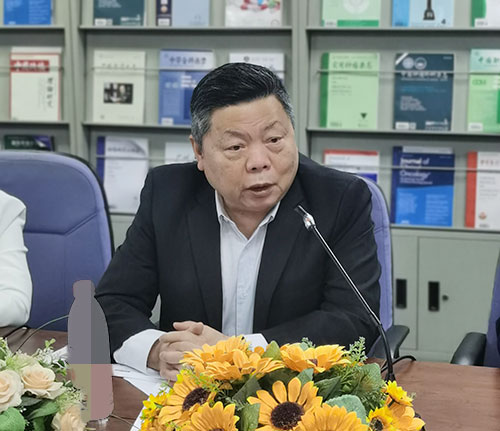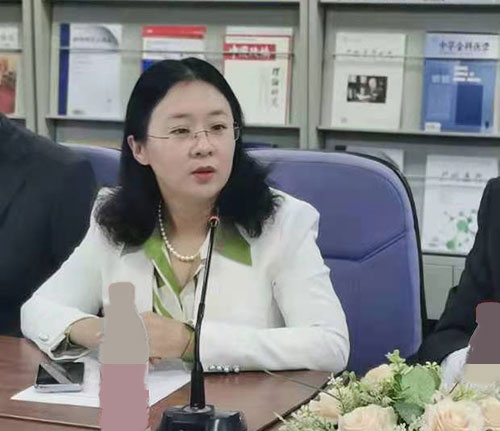

Lung cancer doctors generally agree that stage III lung cancer is the most complex and needs comprehensive treatment because most of them are unresectable tumors. Patients have poor tolerance to radiotherapy and chemotherapy and the treatment effect is not good. Can immunotherapy, as one of the fastest-growing new anti-cancer means in the past 5-10 years, be used in the treatment of stage III lung cancer to benefit patients? A group of Chinese scientists set out to research the question.
At 7:00 AM, January 15 (Beijing time), the research finding of the GEMSTONE-301 trial designed and conducted under the leadership of Wu Yilong, the chief expert of Guangdong Provincial People's Hospital and the Honorary Director of Guangdong Lung Cancer Research Institute was officially published in The Lancet Oncology. The research finding proved Sugemalimab, an anti-PD-L1 antibody, after definitive concurrent or sequential chemoradiotherapy could be an effective consolidation therapy for patients with stage III NSCLC. This new effective treatment method is expected to be written into China’s relevant clinical guidelines as early as the first half of this year, to meet the urgent treatment needs of stage III unresectable lung cancer patients.
Significant finding brings benefits to patients with middle and advanced lung cancer
In China, there are 784,000 new cases of lung cancer detected each year. The incidence and mortality rate of lung cancer account for 20.03% and 26.99% of that of all malignant tumors respectively, ranking the first of its kind. 80-85% of such new cases suffer from non-small-cell lung cancer (NSCLC), a quarter of which are patients with stage III NSCLC (also known as the middle stage) when the diagnosis is confirmed. Moreover, most tumors are unresectable, ranking first among all malignant tumors.
The PACIFIC trial, a multi-center clinical trial released in 2017, confirmed for the first time that the addition of immune consolidation therapy after concurrent chemoradiotherapy can significantly improve the survival of unresectable stage III NSCLC patients, which is called a “tsunami” for the treatment of stage III NSCLC. This research result has changed the standard treatment for inoperable locally advanced lung cancer from the original concurrent chemoradiotherapy to concurrent chemoradiotherapy + immune consolidation therapy, thus quickly changing the clinical practice.
However, only 35–55% of patients can tolerate the toxicity caused by concurrent chemoradiotherapy. According to the guidelines, such patients can accept concurrent chemoradiotherapy + immune consolidation therapy while other patients can only choose sequential chemoradiotherapy (4 cycles of chemotherapy and then radiotherapy). As there is no scientific basis, stage III patients in China who choose sequential chemoradiotherapy cannot undergo immune consolidation therapy. This is a very urgent problem. Therefore, the team led by Professor Wu Yilong began to wonder if these patients can also undergo immune consolidation therapy?
In 2018, the team led by Professor Wu Yilong designed and conducted the world's first randomized, multi-center, double-blind, phase III clinical trial, GEMSTONE-301, for exploring immune consolidation therapy after concurrent chemoradiotherapy and sequential chemoradiotherapy. The results confirmed that for stage III NSCLC patients after concurrent chemoradiotherapy or sequential chemoradiotherapy, PD-L1 inhibitor could be an effective consolidation therapy in terms of efficacy and security.
A total of 381 patients from 50 centers were included in the trial for a treatment time of 2 years. The study has found that as for both concurrent and sequential chemoradiotherapy, under the protection of immune consolidation, the cancer progression risk of the patients had been greatly reduced by 36%!
Patients with inoperable middle and advanced-staged lung cancer benefited from this finding particularly. The progression-free survival rate increased from 25% of the control group to 45%, nearly doubled. As for patients receiving immune consolidation therapy after sequential chemoradiotherapy, which has filled the global research gap, their 1-year progression-free survival rate was 37.6%, more than doubled as compared to 14% of the control group under standard treatment.
Chen Huajun, Deputy Administrative Officer of the First Department of Pulmonary was in charge of the research group of Guangdong Provincial People’s Hospital and managed 34 patients. A patient who came from Hunan Province to Guangdong Provincial People's Hospital for treatment was successfully enrolled. Now she is in a very good physical condition and is helping her daughter take care of child. “She has been in the group for as long as two and a half years and is still under treatment because of pretty good treatment effect,” said her doctor Chen Zhiyong. “As a doctor, I am very gratified!”
The number of middle-stage lung cancer patients suitable for immunotherapy has been increased to more than 90% for the first time
The research finding is of great importance. Only 28 days after release, the paper was invited by the editor of The Lancet Oncology, a journal that ranks second in the world’s cancer field with an impact factor of more than 40 points, and was included in the latest version of the “Guidelines of Chinese Society of Clinical Oncology on Primary Lung Cancer” to be published soon.
Compared to European and American reference versions, the biggest advantage and characteristic of Chinese researches is that sequential chemoradiotherapy patients are also included in addition to concurrent chemoradiotherapy patients, covering a wider range of population. “At the beginning of the design of our study in 2018, we made it clear that our study must cover at least 90% of stage III NSCLC patients.”

Professor Wu Yilong explained that the GEMSTONE-301 trial officially clarified that the standard treatment for stage III NSCLC should be chemoradiotherapy + immunotherapy, and its direct impact is to increase the number of middle-stage lung cancer patients suitable for immunotherapy to more than 90% for the first time in the world.
Professor Wu Yilong thought highly of the international, multicenter, clinical PACIFI trial conducted in 2017, for it affirmed for the first time that conducting immune consolidation therapy after concurrent chemoradiotherapy can significantly improve the survival of unresectable stage III NSCLC patients. The findings could be deemed as a “tsunami” sweeping across the world for the treatment of stage III NSCLC.
However, in clinical practice, only 30-55% of patients with locally advanced lung cancer worldwide can tolerate concurrent chemoradiotherapy. In China, only 60-70% of patients in Grade-III Class-A hospitals like Guangdong Provincial People’s Hospital can accept concurrent chemoradiotherapy, and more than half of the patients nationwide can only accept chemotherapy first and then radiotherapy.
With the findings of GEMSTONE-301 trial, stage III lung cancer patients accounting for 30% of all lung cancer should no longer fear it again, even if their disease is inoperable, or they cannot accept targeted therapy or cannot tolerate chemotherapy and radiotherapy simultaneously.

Professor Zhou Qing, an expert in the comprehensive treatment of lung cancer, Director of Huifu Branch, Guangdong Provincial People’s Hospital and Deputy Director of Guangdong Lung Cancer Research Institute pointed out that with this reliable clinical research basis, “Guidelines of Chinese Society of Clinical Oncology on Primary Lung Cancer (Version 2022)” will be updated to recommend sequential chemoradiotherapy + immune consolidation therapy to stage III NSCLC patients. Based on experience, the updated guidelines will be published around the end of April. The relevant guidelines of the Chinese Society of Lung Cancer, Chinese Anti-cancer Association will also be able to be updated to recommend this treatment.
In terms of the drugs, the PD-L1 used in this trial is Sugemalimab independently developed by CStone Pharmaceuticals, which is a full-human and full-length anti-PD-L1 monoclonal antibody and a natural immunoglobulin G4 (IgG4) monoclonal antibody drug closest to human body.
Guangdong Lung Cancer Research Institute